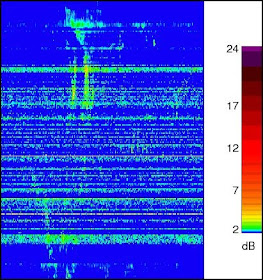Radio JOVE Participant Dusty Samouce, who lives in the mountains of beautiful Montana, has many wonderful entries in the Radio JOVE Archive. Read this article about his Observatory, in the June 2006 Radio JOVE Bulletin.
 Last summer I was camping in the Rocky Mountains, and I stopped at his home shown above. Unfortunately he was not in. I hope to meet him some day.
Last summer I was camping in the Rocky Mountains, and I stopped at his home shown above. Unfortunately he was not in. I hope to meet him some day. Studying Solar events, I found his chart above showing five traces: Radio JOVE 20.1 MHz, NML 25.2 kHz, NLK 24.8 kHZ, a skylight sensor, and a magnetometer.
Studying Solar events, I found his chart above showing five traces: Radio JOVE 20.1 MHz, NML 25.2 kHz, NLK 24.8 kHZ, a skylight sensor, and a magnetometer.It shows the great type III storm of November 11-17 2006.
 Above is the STEREO WAVES spectrum for November 16.
Above is the STEREO WAVES spectrum for November 16.
Storm statistics from Eastwood et al., 2009 , Fig. 3.

 SOHO ultraviolet images at 304 and 171 angstrom.
SOHO ultraviolet images at 304 and 171 angstrom.The Sun is becoming more active, and we expect great radio storms like this one soon.











